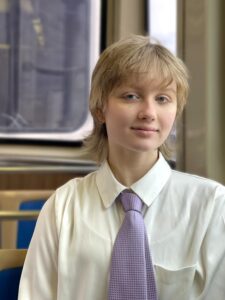High school student Isabella Kolb visits the Center on research visit

Interview conducted by Charlotte Gibbs (PhD student in History, University of Southern California, and Center Graduate Assistant)
January 18, 2024
The Center supports academic research at all academic levels, and recently, Isabella Kolb, a high school student at Walter Payton College Preparatory High School in Chicago, visited the USC Dornsife Center for Advanced Genocide Research to conduct research about life in Stutthof Concentration Camp. During her visit to the Center, she spoke with us about her project, the future of her research, and the mentorship she has received throughout this process.
What is the focus of your project?
My research project focuses on the Nazi concentration camp Stutthof, which is situated in northern Poland near Gdansk. Despite being the first Nazi concentration camp established outside of German borders, it is relatively unknown. I am making a documentary about the camp for an independent research project at my high school to educate audiences more about this camp.
My interest in Stutthof originally began because my family suggested I do research into my family’s history, specifically my Polish ancestry and their involvement in the Second World War. My great-great uncle was a prisoner in Stutthof Concentration Camp for several years. As this camp is lesser known, I thought it was fitting to begin my research there.
What sources are you using? How are you interacting with the various sources?
I am trying to use as many primary sources as possible, although I am well aware that it’s difficult to achieve now. One of my main sources has been oral testimonies, such as those in the USC Shoah Foundation Visual History Archive (VHA). My aunt and mentor, Dr. Anna Krakus (Assistant Professor at University of Copenhagen), has been fundamental throughout this process. I have interviewed a survivor of Stutthof, as well as the daughter of another survivor. I interviewed my grandmother as well, who is the only person I know to have met my great-great uncle. The VHA has been indispensable, as it provided me with several archival sources.
I also visited the Stutthof Museum, which is the former site of the Stutthof concentration camp and interviewed the director. I have a lot of footage of what remains of the camp, as well as the audio from a guided tour that I did while there.
What has your experience been researching this topic? What are some of your takeaways?
This has been a very difficult research process, due to the heavy nature of the content. However, it has been very rewarding, as I have learned a lot about my family history and the history of the Holocaust in general. Although I had a very comprehensive Holocaust education, I did not know half the things I know now when I started this project. I believe this is the same experience for many of my peers. I hope to continue making documentaries in the future and I will definitely use what I have learned during this process to inform future projects.
What is the future of this project?
I am currently wrapping up the research phase in my documentary and will begin editing next month. I hope to finish this project in May, or early June. I may even submit the film to some film festivals!